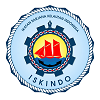PERSEPSI MAHASISWA UIN WALISONGO TERHADAP PROGRAM DIET PLASTIK SEBAGAI UPAYA PENYELAMATAN EKOSISTEM LAUT
Abstract
ABSTRACT
The problem of plastik waste in Indonesia is increasingly complex, when this plastik waste touches water, sea and ocean. The results showed that Indonesia ranked second as the largest country in the world that contributes waste to the sea. Plastik waste is one of the largest polluters in the ocean that can be a serious threat to marine ecosystems. Therefore, it is necessary to do appropriate handling for the problem of plastik waste, one of which is with the diet of plastik bags. In Indonesia itself there has been a Movement of Indonesia Plastik Bag Diet (GIDKP) which certainly raises various perceptions among the community as an effort to save the environment. This study aims to find out the perception of UIN Walisongo Semarang students towards plastik diet program as an effort to save marine ecosystems. This research uses descriptive qualitative research method, with data collection instrument in the form of questionnaire, for respondents consisting of all active students of UIN Walisongo from the class of 2016 to the class of 2019. Based on the research that has been done, from 193 samples obtained shows that the perception of UIN Walisongo students towards plastik diet as an effort to save marine ecosystems is very positive and supports the existence of such movements. This is evidenced by students' knowledge about the use of plastiks and their dangers, the impact of plastiks on marine ecosystems and about plastik diet programs.
Keyword: Perception, Plastik Diet, Marine Ecosystem
ABSTRAK
Permasalahan sampah plastik di Indonesia kian kompleks, ketika sampah plastik ini menyentuh air, laut dan samudera. Hasil penelitian menunjukkan bahwa Indonesia menduduki peringkat kedua sebagai Negara terbesar di dunia yang menyumbang sampah ke laut. Sampah plastik tersebut merupakan salah satu pencemar terbesar di laut yang dapat menjadi ancaman serius bagi ekosistem laut. Maka dari itu perlu dilakukan penanganan yang tepat untuk permasalahan sampah plastik, salah satunya dengan diet kantong plastik. Di Indonesia sendiri telah ada Gerakan Indonesia Diet Kantong Plastik (GIDKP) yang tentunya memunculkan berbagai persepsi dikalangan masyarakat sebagai upaya penyelamatan lingkungan. Penelitian ini bertujuan untuk mengetahui persepsi mahasiswa UIN Walisongo Semarang terhadap program diet plastik sebagai upaya penyelamatan ekosistem laut. Penelitian ini menggunakan metode penelitian deskriptif kualitatif, dengan instrument pengumpulan data berupa kuesioner, untuk respondennya terdiri dari semua Mahasiswa aktif UIN Walisongo mulai angkatan 2016 sampai angkatan 2019. Berdasarkan penelitian yang telah dilakukan, dari 193 sampel yang diperoleh menunjukkan bahwa persepsi mahasiswa UIN Walisongo terhadap diet plastik sebagai upaya penyelamatan ekosistem laut sangat positif dan mendukung adanya gerakan tersebut. Hal tersebut dibuktikan dengan pengetahuan mahasiswa tentang penggunaan plastik dan bahayanya, dampak plastik bagi ekosistem laut dan tentang program diet plastik.
Kata kunci: Persepsi, Diet Plastik, Ekosistem Laut
Full Text:
PDF (Bahasa Indonesia)References
Azwar, S. (2015). Sikap Manusia Teori dan Pengukurannya. Yogyakarta: Pustaka Pelajar.
Cordova, M. R. (2017). Pencemaran Plastik Di Laut. Oseana, 42(3), 21-30.
Galgani, F., Hanke, G., Werner, S. D. V. L., & De Vrees, L. (2013). Marine litter within the European marine strategy framework directive. ICES Journal of Marine Science, 70(6), 1055-1064.
Gregory, M.R. 2009. Environmental Implications of Plastik Debris In Marine Settings-Entanglement, Ingestion, Smothering, Hangers-On, Hitch-Hiking And Alien Invasions. Philos. Trans. Roy. Soc. B: Biol. Sci. 364 (1526): 2013–2025.
Ivan, P. (2016). “Sampah plastik diprediksi penuhi lautan pada 2050”, https://beritagar.id/artikel/sains-tekno/sampah-plastik-diprediksi-penuhi-lautan-pada-2050. Diakses tanggal 4 Mei 2020.
Jambeck, J. R., Geyer, R., Wilcox, C., Siegler, T. R., Perryman, M., Andrady, A., & Law, K. L. (2015). Plastik waste inputs from land into the ocean. Science, 347(6223), 768-771.
Keraf, A. S. (2010). Etika Lingkungan Hidup. Jakarta: Kompas.
Kotler, p. dan Kevin, L.K. (2009). Manajemen Pemasaran. Alih Bahasa Benyamin Molan. Jakarta: Macanan Jaya Cemerlang.
Moleong. (2005). Metodologi Kualitatif Edisi Revisi. Bandung: PT Remaja Rosdakarya.
Puteri, I., Aliya, R., & Muhammad, S. A. (2018). Penerapan Plastik Deposit Refund System sebagai Instrumen Penanggulangan Pencemaran Limbah Plastik di Wilayah Perairan Indonesia. Jurnal Hukum Lingkungan Indonesia, 4(2), 129-150.
Riduwan. (2015). Skala Pengukuran Variabel-Variabel Penelitian. Bandung: Alfabeta.
Setiawan, B., & Fithrah, D. S. (2018). Kampanye Gerakan Indonesia Diet Kantong Plastik Dalam Membentuk Persepsi Masyarakat Bandung. Jurnal Manajemen Komunikasi, 2(2), 102-117.
Simamora, B. (2004). Panduan Riset Perilaku Konsumen. Jakarta: Gramedia Pustaka Utama.
Tahir, A. (2015). Anthropogenic Debris in Seafood. Universitas Hasanuddin: Departemen Ilmu Kelautan Fakultas Ilmu Kelautan dan Perikanan.
Twitter resmi Gerakan Indonesia Diet Kantong Plastik. (2016). Tentang Kami. Diakses dari: http://dietkantongplastik.info/tentang-kami/ tanggal 5 Mei 2020.
World Economic Forum. (2016). “The New Plastiks Economy: Rethinking the future of plastiks”, World Economic Forum.
DOI: https://doi.org/10.21107/jk.v13i3.7642
Refbacks
- There are currently no refbacks.

This work is licensed under a Creative Commons Attribution 4.0 International License.

Jurnal Kelautan by Program Studi Ilmu Kelautan is licensed under a Creative Commons Attribution 4.0 International License.
Published by: Department of Marine Sciences, Trunojoyo University of Madura













